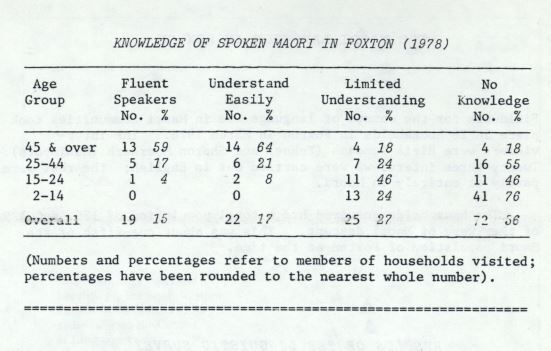-
Ngā Karere me Ngā Rauemi
News and Resources
Ngā Karere me Ngā Rauemi
News and Resources
-
Te Rangaihi Reo Māori
The Movement
Te Rangaihi Reo Māori
The Movement
-
Te Pae Kōrero
Our Community
Te Pae Kōrero
Our Community
-
Huihuinga
Events
Huihuinga
Events
-
Ngā Ara Ako
Learning Pathways
Ngā Ara Ako
Learning Pathways
-
SearchSearch
Search
Search

The results of the survey show that English may have taken over from Maori as the language for everyday use in the home and community in Foxton, perhaps two generations ago. (Several people over 60 understood hardly any Maori.) Many people were worried that Maori might die out altogether as a language for everyday use in Foxton, as Maori was heard mostly on the marae and hardly ever in the homes or community. Some people had spoken Maori as children in their home areas but never used the language in Foxton because, as they said, 'no one speaks Maori around here'. A lot of people said they were sorry they couldn't speak Maori. They were often ashamed about always having to reply in English when spoken to in Maori by their kaumatua.
Manawatū-Whanganui | Horowhenua | 1970-79 | 5% of Māori children can speak te reo. (1970-75) | Story is by tangata whenua
















Comments